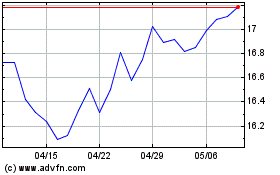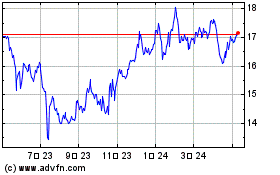By Alexander Osipovich
Technology from the bitcoin world is coming to the
trillion-dollar plumbing that underpins the U.S. stock market.
Last week, the Securities and Exchange Commission gave the green
light to a pilot project in which blockchain -- the technology
behind cryptocurrencies -- will be used to settle trades in stocks
like General Electric Co. and AT&T Inc. Paxos, the blockchain
startup leading the project, hopes to construct a faster and
cheaper way to process stock trades, ultimately reducing costs for
Wall Street banks and investors alike.
The project will be limited to a tiny slice of the U.S. stock
market and there is no guarantee that it will succeed. Still, it
could eventually bring change to the world of clearing and
settlement, which has evolved slowly since the current system was
created in the 1970s.
Settlement is the delivery of securities from sellers to buyers,
while clearing is the process of handling trades from when they are
initially agreed upon to when they are settled. Today, the standard
time it takes to settle a stock trade is two business days -- which
is why investors must typically wait several days to get cash from
their brokers when they sell shares. Paxos's initiative is aimed at
settling trades at the end of the day in which they are agreed
upon, or even sooner.
For decades, an organization called the Depository Trust &
Clearing Corp. has had a monopoly on the clearing and settling of
equities trades in the U.S. Owned by a financial-industry
consortium, DTCC traces its roots to a 1970s effort to eliminate
paper stock certificates and replace them with electronic records.
Last year, it cleared an average of $1.3 trillion in stock trades
each day.
Now, DTCC is about to face something new: competition. On Oct.
28, the SEC issued a letter that lets Paxos set up an experimental
settlement service for stock trades. Paxos, whose other businesses
include a cryptocurrency exchange, expects to launch the service by
the end of the year. Credit Suisse Group AG and Société Générale SA
have said they would use it and Paxos hopes to bring more banks on
board.
The appeal to banks is that a faster, more efficient settlement
service could reduce costs in their stock-trading businesses, an
area where profit margins have shrunk in recent years due to
competition and declining fees.
"There has been so much innovation in the way trading happens
over the past 20 years, with people trading in microseconds, but
there hasn't really been innovation in clearing or settlement,"
Paxos Chief Executive Charles Cascarilla said in an interview.
DTCC says it welcomes the competition. "That kind of innovation
is helpful for the industry," said Michael McClain, the head of its
equities clearing and settlement business. DTCC says it has
modernized its processes, studied blockchain technology and shifted
the U.S. stock market from three-day to two-day settlement in
2017.
That two-day delay comes with various costs. Banks collectively
set aside tens of billions of dollars in capital to cover the risk
that firms elsewhere in DTCC's network will fail before the trades
settle.
There are also separate systems at each big bank, as well as at
DTCC itself, that track what different market participants are
expected to pay or deliver at settlement time. Bankers say this is
inefficient and results in errors when systems disagree with each
other.
"We are constantly reconciling that data," said Jeffrey Rosen, a
New York-based managing director at Société Générale. "That is
hugely expensive. While we've built tools to do it efficiently, it
would be better not to do it."
Paxos's goal is to eliminate these redundant systems by creating
a unified record of trading obligations using blockchain
technology. A blockchain is essentially a database with many copies
distributed across the internet that constantly communicate with
each other to ensure the data doesn't get garbled or hacked.
With cryptocurrencies, the blockchain records who holds how many
coins at any time and it supports the transfer of coins from one
person to another. Similarly, Paxos's planned blockchain would let
banks exchange digital representations of cash and securities to
settle trades with each other.
It would also allow settlement in less than two days. Paxos
plans to give participating banks the option of next-day or
same-day settlement, or perhaps even to settle trades multiple
times a day, Mr. Cascarilla said.
The SEC has put significant limits on Paxos's experiment. Only
about 140 of the most actively traded, least volatile stocks, like
Exxon Mobil Corp. and Bank of America Corp., are eligible for the
project. The number of trades Paxos can settle will also be capped
at 1% of average daily trading volume of those stocks, according to
the SEC's letter.
Moreover, the electronic records that officially record stock
ownership won't leave DTCC but will instead be housed in Paxos's
account at DTCC. So while Paxos's blockchain is recording transfers
of stocks between the participating banks, the stocks will stay
within the existing system -- a measure that will limit disruptions
to the market's plumbing.
Still, proponents say the project offers a blueprint for a
next-generation approach to clearing and settlement.
"There's an enormous amount of capital trapped in the system to
make sure clearing can take place," said Eric Noll, the former CEO
of brokerage Convergex and an adviser to Paxos. "The day you can
clear a trade instantaneously, or near instantaneously, the need
for that capital to be tied up goes away. That should ultimately
lead to lower costs for investors."
To receive our Markets newsletter every morning in your inbox,
click here.
Write to Alexander Osipovich at
alexander.osipovich@dowjones.com
(END) Dow Jones Newswires
November 07, 2019 08:14 ET (13:14 GMT)
Copyright (c) 2019 Dow Jones & Company, Inc.
AT&T (NYSE:T)
過去 株価チャート
から 3 2024 まで 4 2024

AT&T (NYSE:T)
過去 株価チャート
から 4 2023 まで 4 2024
